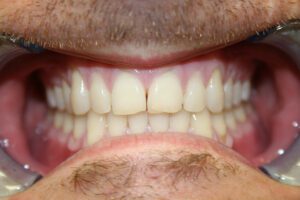
Periodontal disease and type-II diabetes have a strong connection as the latter has been found to be a major cause of the oral disorder commonly known as gum disease. Another relationship between these two illnesses is that if a person suffers from periodontal or gum disease, their blood glucose level rises, thereby setting the stage for type-II diabetes. High blood sugar level can cause tooth and bone loss if not controlled or treated on time. Diabetic patients are therefore advised to clean their teeth regularly and extensively to keep away harmful bacteria and infection that develops into gum disease if proper treatment is not provided.
Poorly controlled diabetes negatively affects the gum tissue in a number of ways. The interaction of cells within the gum tissue changes because of high level of protein glycation. A decreased blood flow due to reduced collagen metabolism also increases the vulnerability of the gum tissue to bacterial attacks. In addition to these, the immune system fails to recognize certain harmful bacteria in mouth and does not produce necessary antibodies to fight the infection. The result of all these negative changes due to increased blood glucose level is an infected gum tissue, which further deteriorates and causes periodontal disease.
Although type-II diabetic patients are generally resistant to the action of insulin, those who also suffer from gum infection develop insulin resistance over time. As a result, it becomes even more difficult to control the rise of blood glucose levels. It is therefore advisable to visit a dentist every 3 months or so and have a detailed checkup to look for any problems. Remember that not all diabetic patients suffer from gum disease, but those who do not properly clean their teeth and indulge in activities like drinking and tobacco smoking are at an increased risk of developing periodontal disease.
The important point to remember is that poorly maintained oral hygiene may be a contributing factor towards high sugar level in blood. Improve your gum tissue health by properly brushing your teeth after every meal and undergo a treatment for reducing gum tissue swelling. There are special medicines available for the treatment of insulin resistance. Do not let this condition go unnoticed by your doctor and have proper tests done to diagnose it on time. People who suffer from gum infection or early symptoms of periodontal disease are at risk of developing type-II diabetes and therefore they are advised to consult a specialist for proper treatment.
Some symptoms of gum disease include frequently bleeding gums, improper bite, loose teeth, receding gum line, and red or swollen gums. If any of these symptoms have already materialized and you suffer from type-II diabetes, immediately see a doctor so that treatment could begin. It is also advisable to eat a well-balanced diet and avoid smoking and drinking alcohol to control both high blood sugar levels and gum infections. If early symptoms of gum disease are ignored, a more serious type of periodontal disease can occur, known as periodontitis, which is difficult to treat and often causes bone loss and many other oral complications.

